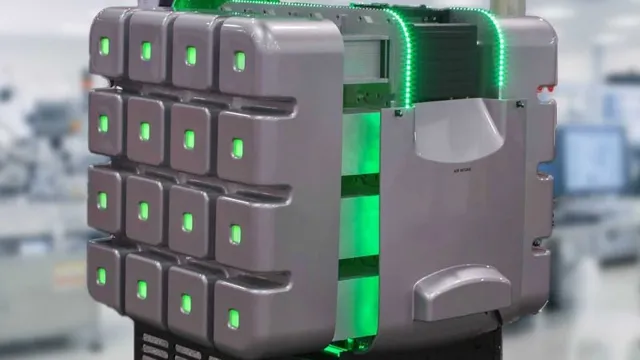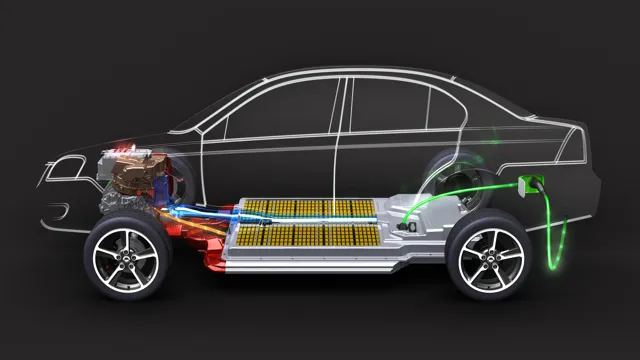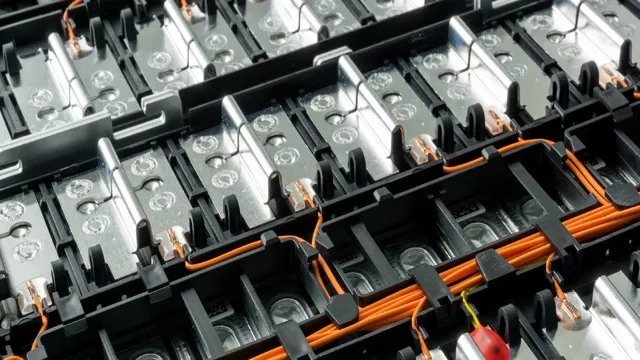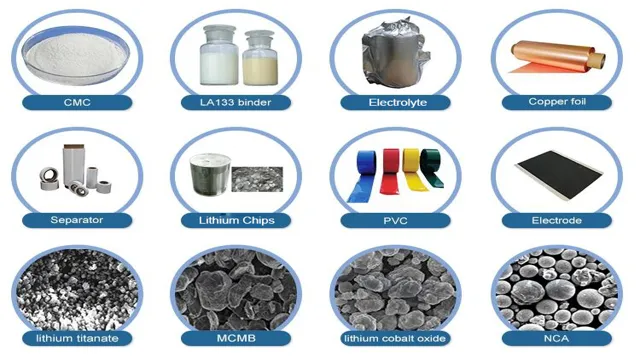The Shocking Truth About Current Electric Car Battery Technology: Your Guide to the Latest Innovations
Electric cars are the future of the automotive industry. With concerns about climate change, the push for sustainable transportation is becoming more prevalent. One major aspect of electric cars is the battery technology used to power them.
The current electric car battery technology is constantly improving, and there are now more options for car manufacturers to choose from than ever before. In this blog post, we will dive into the different types of electric car batteries and discuss the advancements made in this crucial aspect of electric car technology. So buckle up and get ready to learn about the exciting world of electric car batteries!
Overview
Currently, electric car battery technology has come a long way from its initial launch. Today, the most widely used electric car batteries are lithium-ion batteries, due to their high energy density and longevity. But there have been several other types of batteries proposed, including solid-state batteries, flow batteries, and even hydrogen fuel cells.
Although most electric vehicles’ current battery technology supports a range of 100-300 miles, manufacturers are constantly seeking to improve the technology for longer ranges. The most significant improvement that electric car owners are looking forward to is quicker charging times and affordable battery replacements. The environmental advantages of electric cars are immense, but improving battery technology could make them more attractive for long-distance travel and more accessible to all.
With this in mind, efforts to create better, more efficient electric car batteries are currently underway.
Introduction to electric car batteries
Electric car batteries are a vital component of an electric vehicle (EV), powering the motor and enabling it to travel long distances. Compared to traditional combustion engines, EV batteries are much quieter, more efficient, and environmentally friendly. While the cost of EV batteries has declined in recent years, it remains a significant component of the EV’s overall cost.
The most common type of battery used in electric vehicles is a lithium-ion battery, which stores energy through the interaction of lithium ions and graphite electrodes. In addition, EV batteries require careful handling and management to maintain their performance and longevity. Regular charging and discharging, proper cooling, and avoiding extreme temperatures are essential to ensuring the reliability and lifespan of an electric car battery.
Overall, electric car batteries are an exciting and evolving technology that holds enormous potential for driving sustainable transportation.
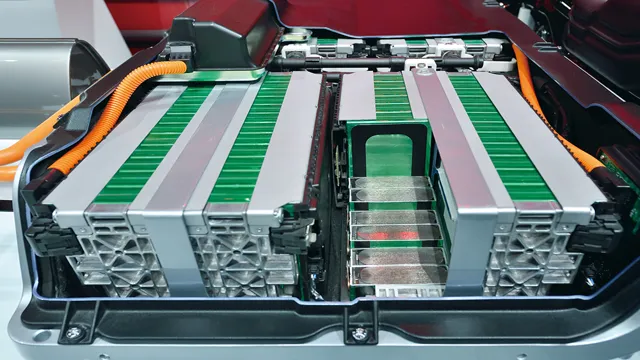
Types of electric car batteries
Electric car batteries are a crucial part of the electric vehicle technology that has taken the world by storm. With an increasing number of these eco-friendly cars on the roads, the question frequently arises about what types of electric car batteries are available. The most commonly used type is lithium-ion batteries, which offer high-energy density, low self-discharge rates, and longer lifetimes.
Another type of battery is the lead-acid battery, which is not as efficient as lithium-ion batteries but is far cheaper and easier to manage. Additionally, nickel-metal hydride batteries have gradually phased out of electric vehicles’ production due to their lower energy density compared to lithium-ion batteries. The choice of battery type in electric vehicles depends on various factors like the cost, environmental impact, and performance requirements.
However, it’s safe to say that the lithium-ion battery has emerged as the current leader in powering electric cars due to its cost-effectiveness, power density, and overall efficiency.
Current battery capacity and range
Current battery technology has made electric vehicles more practical than ever before. The most common types of batteries used in electric cars are lithium-ion batteries, which have a high energy density compared to other battery types. As a result, an electric car can travel longer on a single charge.
The capacity of batteries is measured in kilowatt-hours (kWh), and the range of an electric car depends on its battery capacity. On average, most electric cars have battery capacities ranging from 40 kWh to 100 kWh. The higher the battery capacity, the longer the range of the electric vehicle.
For example, a Tesla Model S Long Range has a battery capacity of 100 kWh and can travel up to 402 miles on a single charge, while a Nissan Leaf has a battery capacity of 40 kWh and has a range of up to 150 miles. As battery technology advances, we can expect to see an increase in battery capacity and longer ranges for electric vehicles, making them an even more viable option for drivers.
Improvements in Battery Technology
Current electric car battery technology has seen significant improvements in recent years. Manufacturers are constantly striving to create batteries that are lighter, more efficient, and have longer life spans. Lithium-ion batteries are currently the most commonly used type of battery in electric cars.
However, solid-state batteries are being developed as an alternative to lithium-ion batteries, as they are supposed to be safer, more energy-dense, and have longer life spans. With more efficient batteries, the range of electric cars is improving, making them a more practical alternative to traditional combustion engine cars. Additionally, advancements in battery technology are expected to bring down the cost of electric cars, making them more accessible to the general public.
The future of electric car battery technology looks promising, as manufacturers continue to work on improving their performance and efficiency.
Introduction to battery technology advancements
Battery technology has seen some significant advancements in recent years, with manufacturers focusing on improving their efficiency and overall lifespan. One significant advancement has been the development of solid-state batteries that replace the standard liquid or gel electrolytes with a solid material. Solid-state batteries offer a range of benefits, including increased safety, faster charging times, and longer lifespans.
Another breakthrough has been achieved through the use of lithium-sulfur batteries that have a higher energy density than the traditional lithium-ion batteries. These batteries are also lighter and more environmentally friendly, making them an appealing alternative. With battery technology advancing at such a rapid pace, it’s exciting to imagine how these innovations will impact our daily lives and industries such as electric vehicles and renewable energy storage in the years to come.
Solid state batteries
Solid state batteries are the latest advancement in battery technology. They are a step up from traditional lithium-ion batteries, offering a compact size, higher energy density, and faster charging times. These batteries are made using solid electrolytes instead of liquid ones, which makes them safer and less prone to leakage or combustion.
The solid-state batteries are also more stable, even at higher temperatures. With these benefits, solid-state batteries are becoming increasingly popular in electric vehicles and portable electronics manufacturing. Researchers are currently working on improving the material and manufacturing processes of these batteries to extend their lifespan and bring down their costs.
Overall, solid-state batteries show great promise as they are safer, more efficient, and less resource-intensive, which can lead to a more sustainable future.
Lithium-sulfur batteries
Lithium-sulfur batteries are a promising new development in battery technology, offering significant improvements over traditional lithium-ion batteries. These batteries are more energy-dense, meaning they can store more energy in the same amount of space. This makes them ideal for use in electric vehicles, where space is limited and every gram counts.
Lithium-sulfur batteries are also lighter and cheaper than lithium-ion batteries, making them attractive to manufacturers looking to reduce costs and improve performance. However, they do have some drawbacks, including a shorter lifespan and lower performance in cold temperatures. Despite these challenges, researchers are making progress in improving the technology, and lithium-sulfur batteries are likely to become a viable alternative to lithium-ion batteries in the very near future.
Graphene batteries
Graphene batteries are a relatively new development in battery technology that has the potential to revolutionize the industry. Graphene batteries are made from a thin layer of graphene, which is an incredibly strong and lightweight material that is 200 times stronger than steel and is an excellent conductor of electricity. Graphene batteries have several advantages over traditional lithium-ion batteries, including faster charging times, longer cycle life, and higher energy density.
The use of graphene also makes these batteries more durable, which means they can withstand the wear and tear of regular use much better than their counterparts. With all these benefits, it’s no wonder that researchers and manufacturers are excited about the potential of graphene batteries to power the devices of the future. As technology continues to evolve, graphene batteries will undoubtedly play a significant role in our lives, enabling us to do more than we ever thought possible.
Factors Affecting Battery Performance
Current electric car battery technology has come a long way, but there are still factors that can affect battery performance. The most significant factor is temperature. Electric car batteries work best when kept at a consistent temperature between 60 and 80 degrees Fahrenheit.
Extreme temperatures, whether hot or cold, can reduce battery capacity and overall longevity. Another important factor is the age of the battery. As electric car batteries age, their charging capacity decreases, and they won’t be able to hold as much energy as they did when they were new.
The amount of energy the car uses also plays a role in battery performance, with more energy-intensive features like air conditioning and heating reducing battery life. Lastly, battery efficiency can be affected by the way the car is driven. Aggressive driving and frequent acceleration and braking can drain the battery more quickly.
Overall, while current electric car battery technology has improved, these factors can still have a significant impact on battery performance.
Temperature and weather impacts on batteries
When it comes to your battery’s performance, the temperature and weather play a significant role. Extreme temperatures can cause damage to your battery, affecting its longevity and overall performance. Cold weather can reduce the battery’s capacity, making it more difficult to start your vehicle.
On the other hand, hot weather can cause the electrolyte solution in the battery to evaporate, leading to damage and a shorter lifespan. It’s essential to ensure your battery is protected from extreme temperatures by keeping it covered and insulated in harsh weather conditions. Regular maintenance, such as cleaning and ensuring proper charging, can also help preserve your battery’s performance.
Remember, taking care of your battery will save you money on repairs and replacement in the long run.
Charging infrastructure and time
When it comes to electric vehicles, charging infrastructure and time are essential factors affecting battery performance. The availability of charging stations and the speed of charging can make or break the experience for EV drivers. It’s important to note that not all charging stations offer the same charging speed, and it can vary based on the type of charger and the EV model.
Charging at home is usually the most convenient and cost-effective option, but it can take anywhere between 8 and 24 hours to fully charge a battery depending on the charging rate and battery size. Public fast-charging stations can replenish the battery to 80% in as little as 30 minutes, but they are not as widely available as regular chargers. That’s why EV drivers often plan their trips around the availability of charging stations, and the charging time is a crucial aspect to consider.
In summary, charging infrastructure and time are two of the most essential factors to keep in mind while embracing electric vehicles to ensure optimal battery performance.
Battery lifespan and maintenance
Your battery’s lifespan and performance rely on several factors, including regular maintenance. No matter how well-designed your battery is, regular use will inevitably result in its deterioration. The most crucial element of battery maintenance is avoiding extreme temperatures, both hot and cold, which can harm its overall performance.
It’s also critical to ensure that your battery’s voltage remains within optimal levels, as fluctuations can lead to power drain or battery damage. The quality of your battery’s charging equipment and technique can have a significant impact on its longevity and performance, as high-quality chargers will provide the optimal amount of current and voltage. Long periods of inactivity can also negatively affect battery lifespan, resulting in reduced capacity and performance.
By following these tips, you can ensure your battery remains healthy, enabling it to operate efficiently for an extended period.
Future of Electric Car Batteries
Current electric car battery technology is continuously evolving to enhance the energy density, efficiency, and performance of electric vehicles. The future of electric car batteries is promising with innovative advancements such as solid-state batteries, lithium-sulfur batteries, and flow batteries. Solid-state batteries have the potential to replace traditional lithium-ion batteries as they offer higher energy density, quick charging times, and increased safety.
Lithium-sulfur batteries are another type of battery that could revolutionize the electric car industry as they have a higher theoretical energy density than traditional lithium-ion batteries. Flow batteries, on the other hand, are ideal for long-distance driving as they offer a limitless driving range by replacing the need to recharge the battery with refueling the electrolyte. Overall, improvements in battery technology are essential in creating a more sustainable and efficient future for transportation.
Predicted advancements in technology
Electric Car Batteries Electric car batteries are set to undergo major advancements in the coming years, with a particular emphasis on increasing energy density and reducing costs. One promising technology that could revolutionize the electric car industry is solid-state batteries. Unlike traditional lithium-ion batteries that use a liquid or polymer electrolyte, solid-state batteries use a solid electrolyte, which is not only safer and more stable, but also allows for denser energy storage.
This means that solid-state batteries could potentially provide much longer ranges for electric vehicles, making them even more appealing to consumers. Additionally, solid-state batteries are expected to have a longer lifespan and be more environmentally-friendly, further boosting their attractiveness. As researchers and companies continue to invest in solid-state battery technology, we can expect to see major breakthroughs in the near future, leading to a new era of electric cars that are more efficient, affordable, and enjoyable to use.
Implications for cleaner and more efficient transportation
As we move towards a cleaner and more efficient future of transportation, the role of electric car batteries cannot be overstated. The future of electric car batteries looks bright, with advancements in technology leading to longer lasting batteries that can store more energy in a smaller space. This means that electric cars can travel longer distances on a single charge, making them more practical for everyday use.
Moreover, with the increasing demand for electric vehicles, the cost of batteries is expected to decrease, making them more accessible to the average consumer. This shift towards electric car batteries will have significant implications for the environment as well, as we move away from fossil fuels and towards a more sustainable energy source. As we continue to make technological advancements in the field of electric car batteries, the hope is that we can continue to make strides towards a cleaner and more sustainable future.
Impact on energy storage and electricity grid
Electric car batteries have been making significant improvements in recent years, indicating an exciting future for energy storage and the electricity grid. Researchers are diligently working on developing electric car batteries that have a longer life span, are safer, and more affordable. These improvements have the potential to revolutionize the way we think about energy storage and power grids.
In the near future, we could see a surge of electric car batteries being used as rechargeable energy storage systems for homes and buildings. This concept is already starting to gain traction, with companies like Tesla leading the charge. These batteries could not only store unused renewable energy but also be used during peak usage hours, reducing the stress on the electricity grid.
As electric car batteries become more prevalent, we could see a shift towards a more sustainable and resilient energy system.
Conclusion
In conclusion, current electric car battery technology has come a long way, providing improved performance and longer range for drivers. However, the quest for a perfect battery that can match the convenience and range of traditional gasoline vehicles is still ongoing. As technology continues to evolve, we can expect to see even more advancements in electric car battery technology, bringing us one step closer to a cleaner, more sustainable future on the road.
“
FAQs
What is the current state of electric car battery technology?
Electric car battery technology is constantly improving but currently, most electric cars use lithium-ion battery technology.
How long do electric car batteries last?
The lifespan of electric car batteries depends on various factors including usage, temperature, and charging habits. Generally, they can last anywhere between 8 to 10 years.
How much does it cost to replace an electric car battery?
Electric car battery replacement costs vary depending on the car model and battery capacity. Generally, they can cost anywhere from $5,000 to $15,000.
Are there any upcoming advancements in electric car battery technology?
Yes, research is being done on various battery technologies such as solid-state batteries and lithium-sulfur batteries. These technologies are expected to improve battery performance and reduce costs in the future.
